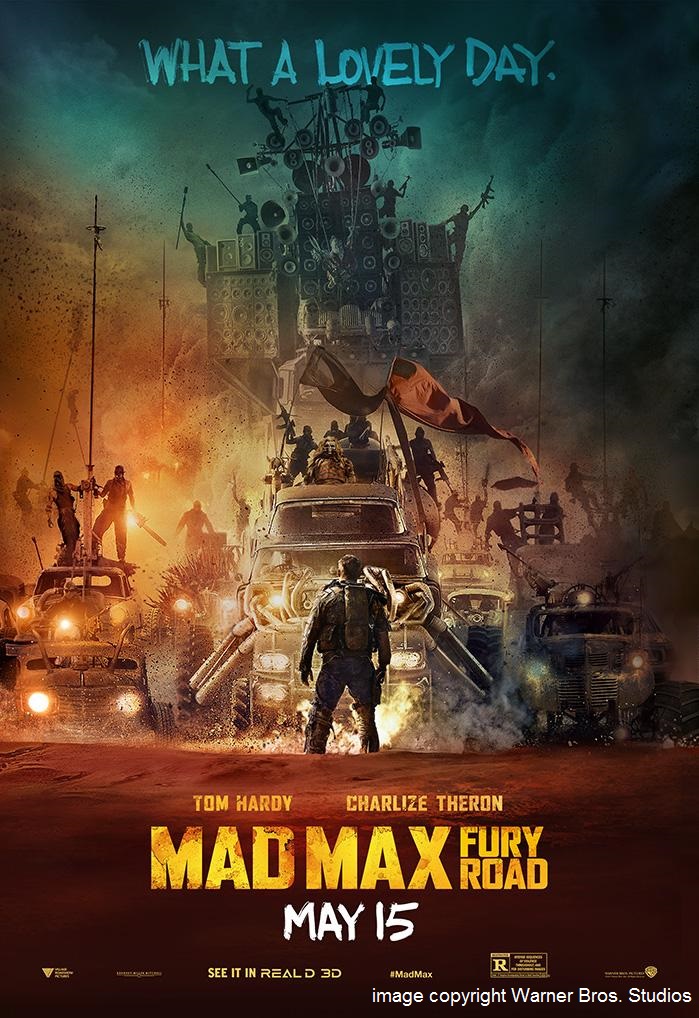Start Your Engines: The End Is Nigh!
While most of the world is going gaga for the new Avengers movie, another cinematic juggernaut is bearing down on us.1 A film that is part of a legendary franchise which hasn’t seen a new entry for thirty years. A film that promises to have more automotive mayhem than Vin Diesel can shake a stick at.
Mad Max: Fury Road looks awesome. I mean really AWESOME. I can truthfully say that this is the most excited I have ever been about a new movie in my entire life. I don’t know what it is, but I’m a sucker for post-apocalypse movies, and the Mad Max films are the cream of the campy crop.
Of course, there are hundreds of entries into the post-apoc category. They range from cheesy (Waterworld) to serious (The Road) to I’ve-lost-all-will-to-live (Threads) to strange (A Boy and His Dog, which gets my vote for best post-apocalyptic movie ending ever) to just plain bonkers (Six-String Samurai). And don’t forget the zombies. Grunge fashion, heavy weaponry, desolate landscapes, and motorized maniacs are staples of the genre, which give directors plenty of excuses to be as crazy as they want to be. The stakes are either very high or non-existent, the characters are either naively hopeful or utterly nihilistic, and thespian craft usually gives way to copious action and violence.
Anyone who has ever picked up a Bible certainly knows about the post-apocalyptic nightmares in its pages. Daniel, Ezekiel, and Isaiah laid it on pretty thick, as did New Testament writers Peter and John. Fire, plagues, famine, war, demons running amok, pale horses, and bowls of judgment assail our humble planet, purging the world of its wickedness to prepare the way for God’s kingdom on Earth, which is where Heaven will actually be.
Many post-apoc films take cues from the Bible, and some, such as The Book of Eli, make it a central part of the story. But is there any way to reconcile the cynical worldview of Hollywood’s apocalypse with the ultimately hopeful horrors of the Bible?
That depends on where you start. A worldview without God would likely regard the desolation of mankind as an inevitability, with the remnants of humanity rising from the ashes and rebuilding their world which would eventually head back down the same road, or perhaps the entire annihilation of the species. The vehemence with which humanity pursues war and aggression is hardly any cause for hope, especially since the bullets get bigger by the day. The ruination of our planet and civilization seems like only a matter of time.
 Someone with a Christian worldview would feel the same way, except there is a hope for salvation at the end of it. I believe with confidence that the human race will not be annihilated, despite our best efforts, because the promises of the Bible, upon which I base my faith, would be worthless. I don’t know what state humanity will be in when God finally returns to establish His kingdom, but there will be something here.
Someone with a Christian worldview would feel the same way, except there is a hope for salvation at the end of it. I believe with confidence that the human race will not be annihilated, despite our best efforts, because the promises of the Bible, upon which I base my faith, would be worthless. I don’t know what state humanity will be in when God finally returns to establish His kingdom, but there will be something here.
There is rarely any God in Hollywood’s idea of the end of days. Humanity is left to fend for itself, and it usually does endure thanks to the actions of a brave hero. This does not necessarily mean that filmmakers are deliberately ignoring Biblical prophecies when making their films, but the humanistic element in these movies is undeniable. What is worth saving is human civilization and culture, not souls. Morality and conscience are often tossed out the window in favor of survival of the fittest. Staying alive is the ultimate virtue, and the cost is usually great. Theistic fantasies like organized religion have been burned away, leaving the raw human animal fully exposed. It’s a simple worldview – survive at all costs – but the futility often peeks through the rags.
This hopelessness is very prominent in a series like The Walking Dead. As season after season trudges on, there is hardly any hope for the characters to grab onto, and I must confess that even my tolerance for grimness is tested. The human race needs hope to survive, and if you remove God from the picture, the only source of hope is ourselves. When I read the headlines every morning, I don’t see much cause for rejoicing.
A real-life apocalypse would be far less sensational and entertaining than what we see on the screen, but if I am unfortunate enough to experience a cataclysmic event in my lifetime, I know that it won’t be the end. The world won’t end with a whimper, nor with a bang.
It will begin with the cleansing light of God’s glory.
- Editor’s note: SpecFaith welcomes new staff explorer Mark Carver, who will explore fantastical stories every other Wednesday. (Other Wednesday articles will continue by staff explorer Shannon McDermott. Learn more about us all at Meet SpecFaith. ↩







































Thanks for the opportunity, guys!
What a wonderful take on the post apocalyptic genre as a whole. Virtually every time we see it in movies or books, the genre almost always distills down to a man who is no different than the beast of the field. It’s pragmatically an atheistic worldview on screen. Powerful insight Mark. Thank you for sharing such a great post!
Thanks, I’m glad you enjoyed it.
Buuuuut, that’s the entire point of post-apocalyptic flicks, isn’t it? The destruction of civilization. And on a very utilitarian level, the difference between humankind and animalkind is civilization. So this gives us the space to explore how much of us is “merely” animal (because most of the function of these bodies of ours are animalistic, eating and breathing and sustaining), what is the stuff of civilization/culture/humanity. We can loop that back to what that means for religion or belief, when belief is a lot higher in the Hierarchy of Needs than food and shelter. What happens when religion, like the whole of civilization, is a luxury that nobody can afford anymore?
There’s nothing wrong with the destruction. As you said, that’s the point. It’s cathartic, sometimes even refreshing. I’m just exploring the element that these movies usually lack, the spiritual aspect, and whether these situations are possible from a Christian viewpoint through the lens of the Bible. But at the end of the day, they’re all just for fun.
So where would you rank belief on the hierarchy of needs? Marslow’s (if that’s his name, I forgot as soon as I closed the tab) model has “purpose” rather high up on the hierarchy, after physiological and safety/security. But since the hierarchy of needs varies from culture to culture, the more collectivist cultures would probably lump “purpose” into “maintaining the community,” so it would essentially blend into safety/security.
So I guess the purpose of this semi-research paper I’m making the comments section into is to get you to elaborate on the psychology of the thing, because the good stuff is in the psychology.
Personally, I would hope that my faith would transcend any condition, no matter how desperate or essential to survival. If I abandoned my religious beliefs in order to satisfy my basic human needs, then my faith is worthless. The whole purpose of belief in God’s grace is a hope for something beyond this life, and therefore beyond the hierarchy of needs.
At the same time, it wouldn’t be effortless — not if this story has actual stakes that engage the audience.
It’s a really lame story just to do “look at this awesome Christian community where everything is perfect versus this eeeevil pagan/heathen/atheist community.” That’s not even really a story: that’s propaganda.
And that’s not even touching on how Christianity (or even just Protestantism) might change due to the apocalypse. We wouldn’t have the same network of gatekeepers we do now. We might not even have gatekeepers at all, so it could get weird (it gets pretty weird even nowadays).
Oh, it would take extraordinary effort to actually live out a faith like that, especially under duress. I’m sure someone’s written a story about this. And if they haven’t, they should.
A good example of what you want is in Leigh Brackett’s The Long Tomorrow. It’s an apocalypse where the dominant culture that survives is mennonite/amish, and there’s a small cadre of scientists trying to fix things. Unusually it escapes being propaganda either way; the amish life is stultifying but much more important to keep society going than the hero thought, while life as a scientist is more freeing but limited by the nihilism and violence of the past.
Welcome aboard, Mark. Great to have you as part of the team. Batten down the hatches. This ride can get bumpy sometimes. 😉
Becky
Thanks. I’m locked and loaded.
I think one interesting aspect post apocalyptic stories can/should explore is how being prepared in terms of one’s mind and skill helps people in stressful situations. One reason people might become horrible in a tense situation is because they have lived simpler lives where they could feel mostly fed and secure. Put those people in a situation where they must react too quickly to think through it, they are more likely I act on instinct and, say, rush to safety instead of taking someone else that may be relying on them. Someone who has had military training and has been in tense situations before might stand a better chance of looking to make sure as many people as possible reach safety. I think post apocalyptic stories are good for Christians, and everyone else, because they help people work through how they would and should react in certain situations.
I like to think that I would be a leather-studded, flamethrower-wielding warrior of the wasteland for God. Whatever that means.
Now I’m thinking about The Book of Eli, even though the main char may not entirely match your description :p